The Honor V30 Pro is a top-end device in the Huawei subsidiary’s lineup. Released last December, it prides itself on a 6.57-inch IPS LCD display, a high-end HiSilicon Kirin 990 chipset, 8 GB of RAM, and a triple main camera. With a Camera score of 122, the Honor V30 Pro made it easily into the top ten of our mobile camera ranking. Let’s see if it performs just as impressively in our rigorous DXOMARK audio test protocol.
Key audio specifications:
• Single-speaker design
• Bluetooth BT5.1, BLE/SBC/AAC/LDAC HD audio
• No headphone jack (USB-C adapter included)
About DXOMARK Audio tests: For scoring and analysis in our smartphone audio reviews, DXOMARK engineers perform a variety of objective tests and undertake more than 20 hours of perceptual evaluation under controlled lab conditions. This article highlights the most important results of our testing. Note that we evaluate both Playback and Recording using only the device’s built-in hardware and default apps. (For more details about our Playback protocol, click here; for more details about our Recording protocol, click here.)
Test summary


The Honor V30 Pro delivers an unbalanced audio performance, with middling playback results but stellar recording achievements.
Three identified flaws impair audio playback quality. First, its single-speaker design brings the phone’s Spatial sub-score to a very low 28. Second, the lack of low-end extension affects tonal reproduction on the timbre field, as well as bass precision in the dynamics area. Finally, excessive compression at high volumes not only impairs dynamics, but reduces maximum volume capability and induces temporal artifacts.

On the other hand, with a Recording score of 74, the V30 Pro delivers the best recording performance we’ve measured to date, with no less than three category-leading sub-scores (Timbre, Spatial, and Dynamics), thanks to an exemplary frequency response, well-preserved dynamics, and excellent spatial rendering. The overall recorded loudness is more than satisfying, few artifacts are noticeable, and background sound is very natural.
Sub-scores explained
The DXOMARK Audio overall score of 59 for the Honor V30 Pro is derived from its Playback and Recording scores and their respective sub-scores. In this section, we’ll take a closer look at these audio quality sub-scores and explain what they mean for the user.
Playback

Timbre
Honor V30 Pro
59
89
DXOMARK timbre tests measure how well a phone reproduces sound across the audible tonal range and takes into account bass, midrange, treble, tonal balance, and volume dependency.
The V30 Pro delivers a decent timbre performance, thanks to clear and precise high-ends. Mids (midrange frequencies) and treble are consistently good in every genre (Pop Rock, HipHop, Electronics, Classical, Movies). On the other hand, the lack of bass extension strongly impairs the Timbre sub-score: as shown in the graph below (blue curve), the speaker cuts abruptly below 150 Hz.
Additionally, high frequencies can sound aggressive at high volumes.

Dynamics
Honor V30 Pro
60
81
Our Dynamics tests measure how well a device reproduces the energy level of a sound source.
As expected, the lack of bass affects the bass precision sub-attribute (especially at soft and nominal volumes), which in turn affects the Dynamics sub-score. However, good attack, thanks to the precision of the upper frequencies, keeps the score afloat. At maximum volumes, dynamics are reduced by a maladjusted compression, which slightly crushes the transients.

Spatial
Honor V30 Pro
28
88
Honor equipped its latest flagship phone with a single speaker, and naturally, this design severely limits the phone’s abilities, as wideness is essentially non-existent. Balance and localizability are also impaired, as most of the sound is shifted to the right (when listening in landscape mode), where the only speaker lies. However, it reproduces distance well, once again thanks to mids and trebles.
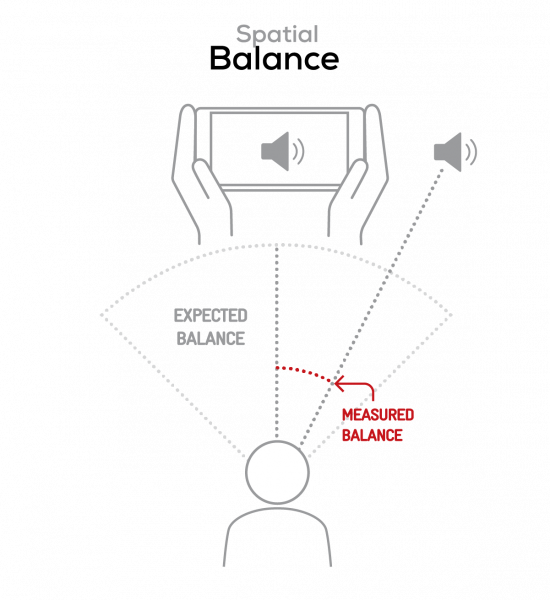
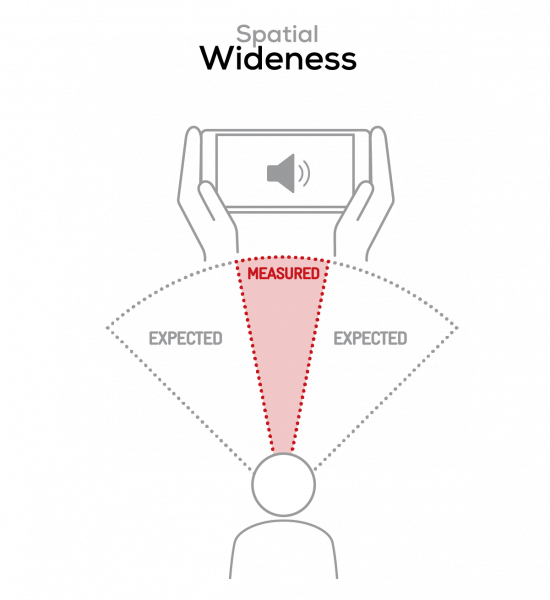

Volume
Honor V30 Pro
62
91
Our Volume tests measure both the overall loudness a device is able to produce and how smoothly volume increases and decreases based on user input.
The overall volume performance is decent, thanks to good consistency and natural volume steps. However, the excessive compression mentioned in the paragraph on dynamics above affects audio content at maximum volumes. On synthetic signals, such as pink noise, compression occurs on random occasions, leading to different output levels every time. Furthermore, at minimum volumes, high dynamic content lacks intelligibility.
| Hip-Hop | Classical |
| 71.4 dBA | 68.2 dBA |

Artifacts
Honor V30 Pro
85
113
Our Artifacts tests measure how much source audio is distorted when played back through a device’s speaker. Distortion can occur both because of sound processing in the device and because of the quality of the speakers.
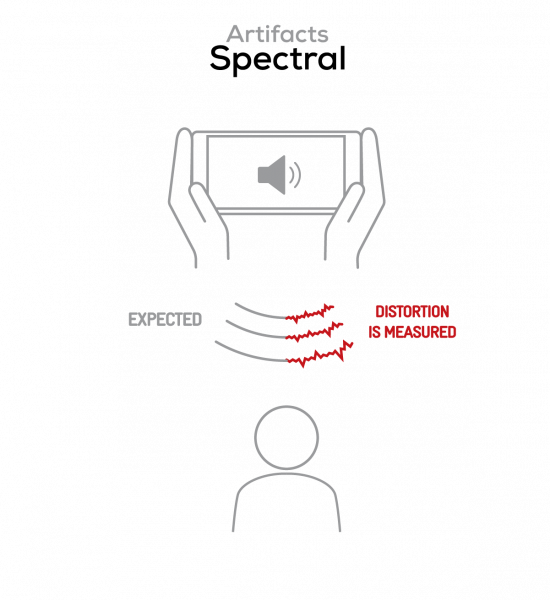
Overcompression also lowers the Artifacts sub-score, due to the pumping effect it generates at maximum volumes. Depending on the content, the overly-present upper frequencies can become aggressive by inducing hissing. At nominal volumes, however, audio played back through the Honor V30 Pro’s unique speaker suffers from very few artifacts.
Recording

Timbre
Honor V30 Pro
84
91
The Honor V30 Pro’s recording frequency response is exemplary: as shown in the graph below, its consistency throughout all frequency ranges is outstanding. While bass extension is excellent, high-end extension is slightly lacking—but nothing serious compared to other devices.
This faithful tonal reproduction that occurred in all our simulated use cases, including high SPL scenarios, leads to the best Timbre sub-score we’ve measured to date.

Dynamics
Honor V30 Pro
70
81
Sound dynamics are particularly well preserved through the Honor V30 Pro’s microphones, thanks to a great SNR (signal-to-noise ratio) and respect of the shape of the sound envelope. All use cases are efficient, with special mention for selfie videos, life videos, and Concerts. Clarity of speech, however, is (very) slightly impaired by the bass response — but once again, nothing serious compared to most devices.

Spatial
Honor V30 Pro
74
78
The smartphone’s Spatial performance is just as remarkable, earning the V30 Pro another top score. Localizability and wideness are excellent, except when recording videos in selfie mode. Thanks to the exemplary tonal balance, it renders distance accurately.
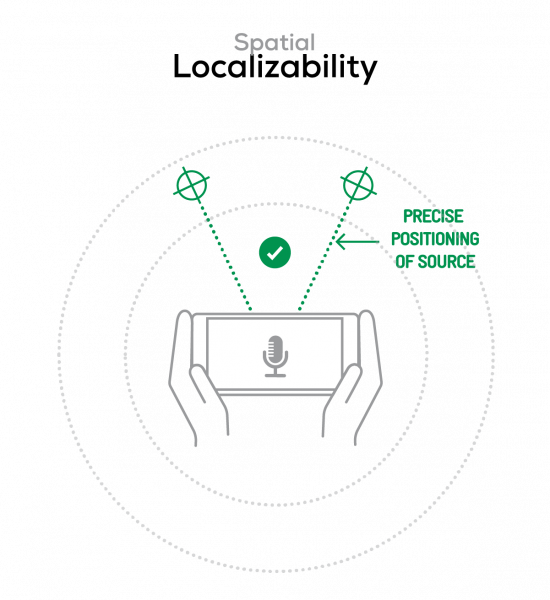
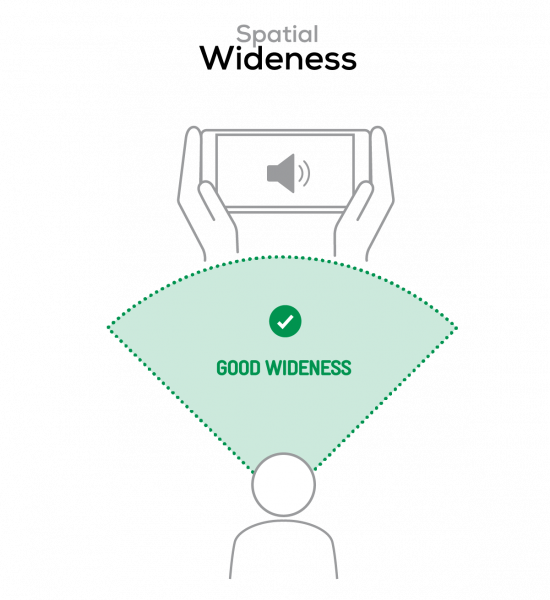


Volume
Honor V30 Pro
72
99
Overall recorded loudness is excellent in all tested scenarios (concert, videos, meeting room, memos). The maximum level could be a little louder, however. Here are our test results, measured in LUFS (Loudness Unit Full Scale):
| Meeting | Life Video | Selfie Video | Memo |
| -23.8 LUFS | -19.1 LUFS | -18.3 LUFS | -19.3 LUFS |
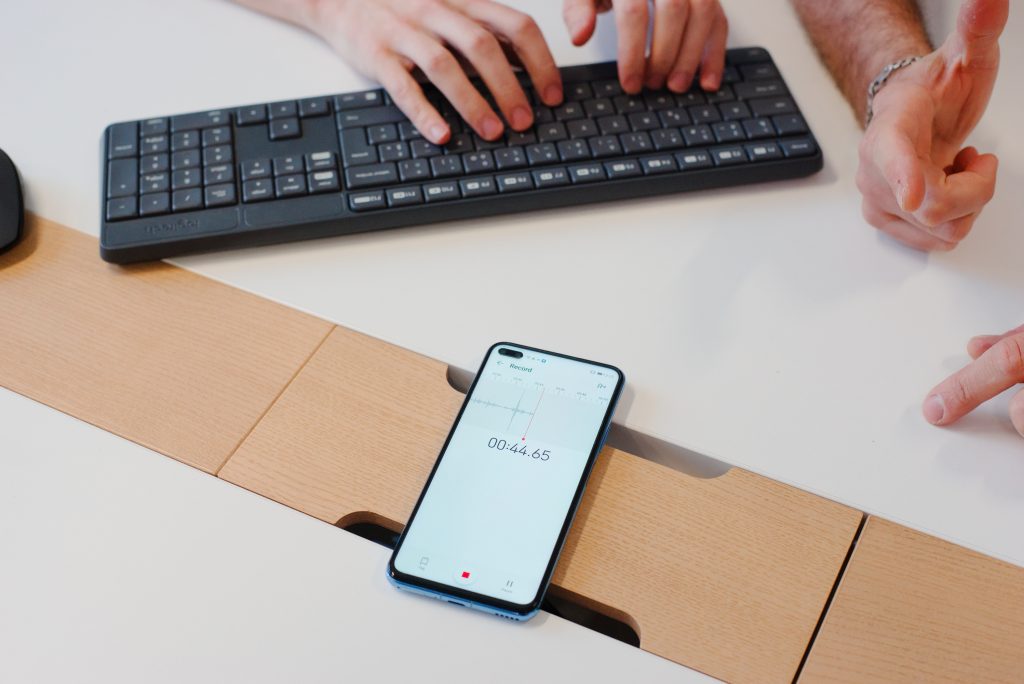

Artifacts
Honor V30 Pro
77
97
Overall, sounds recorded with the Honor V30 Pro suffer from very few artifacts, even in loud environments. A few spectral artifacts (distortion) can occur when recording concerts or selfie videos, while light temporal artifacts (compression) are noticeable when filming videos. That all said, beware of microphone occlusion, especially in selfie mode.
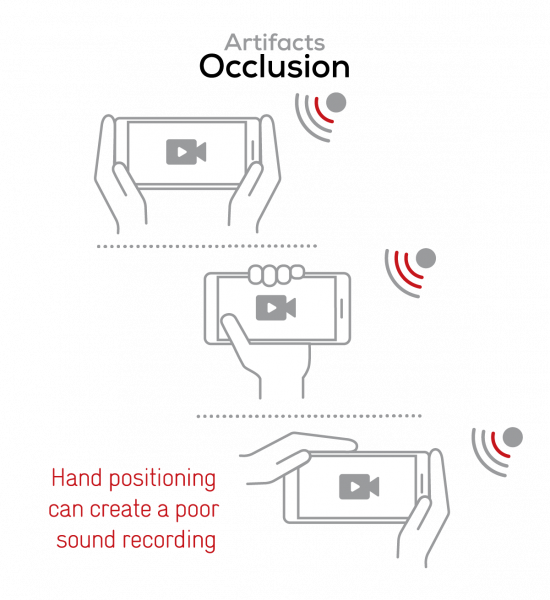

Background
Honor V30 Pro
50
60
All the previous ingredients (excellent timbre, spatial and dynamics performances) point to a great background rendering, and great it is indeed, thanks to a very natural tonal balance and very few noticeable artifacts.
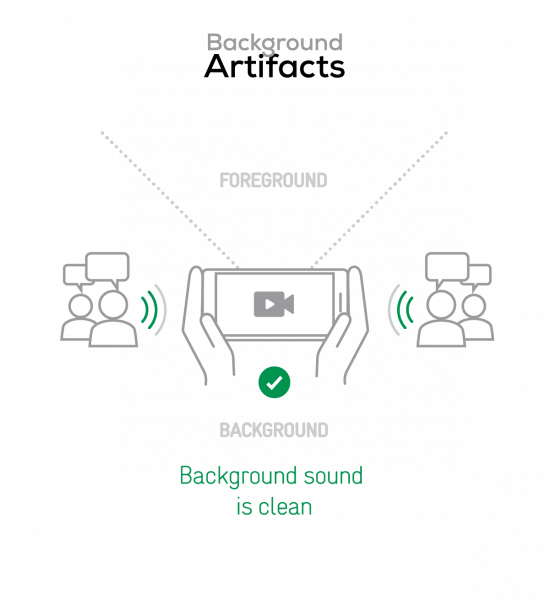
Conclusion
By choosing to equip its latest flagship with a single speaker, Honor greatly affected the V30 Pro’s playback performance. A lack of low-end extension and excessive compression at high volumes also impair its timbre, dynamics, volume, and artifacts performances. However, the Honor V30 Pro’s microphones deliver outstanding tonal balance, excellent spatial capture, and faithful dynamics. In the recording area, these category-leading sub-scores, along with good overall loudness, few artifacts, and a very natural background rendering make Honor’s low-cost flagship simply the best.
Playback
Pros
• Decent timbre performance, thanks to clear and precise high-ends
• Attack is preserved for most content at low and nominal volumes
• Distance is well reproduced
Cons
• Poor spatial performance due to the single-speaker design
• Excessive compression at maximum volumes
• Lack of low-end extension
Recording
Pros
• Outstanding timbre and spatial performances
• Excellent tonal balance and very few artifacts in high SPL scenarios
• Great loudness
• Consistent quality regardless of the app used
Cons
• High-end extension is slightly lacking
• Selfie video app suffers from poor wideness

 English
English 中文
中文

DXOMARK invites our readership (you) to post comments on the articles on this website. Read more about our Comment Policy.